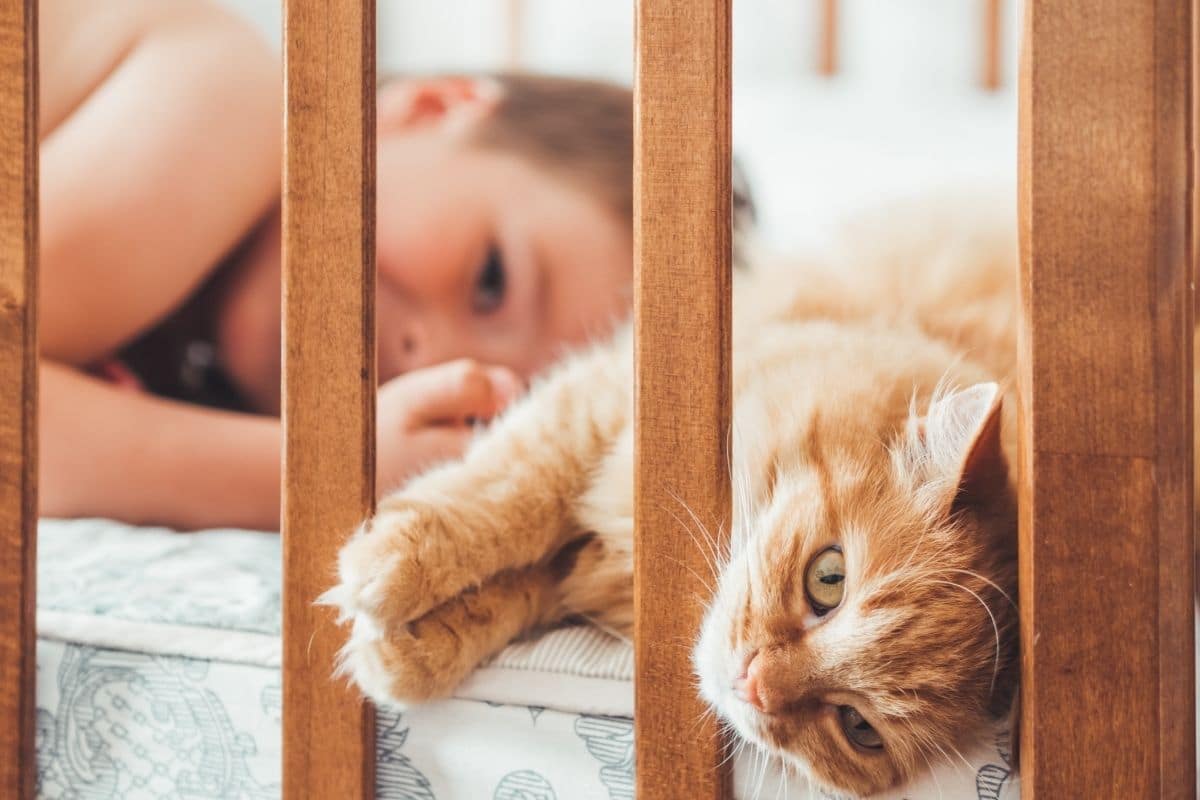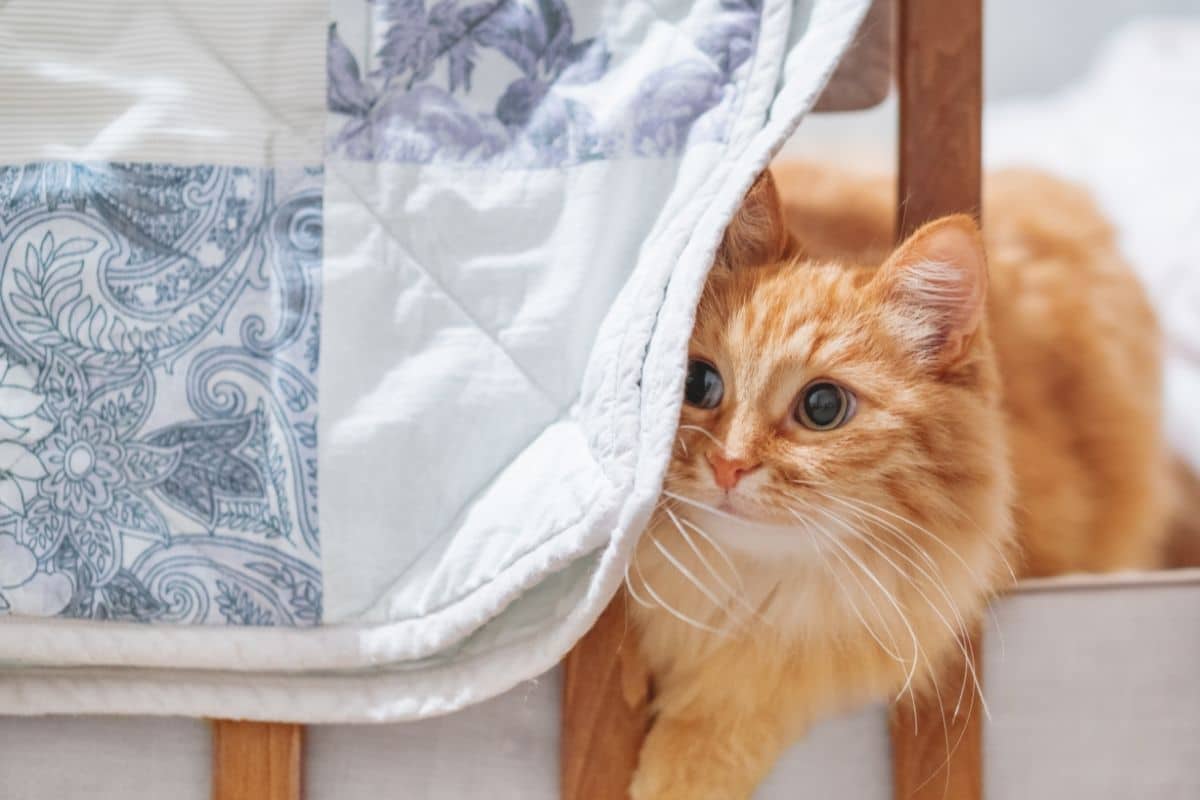Cats are very curious animals. If they see something new or interesting, they want to investigate it.
This curiosity often leads them to climb into places where they shouldn’t be – including your baby’s crib.

Many cats love sleeping in bed with their owners, and this means that they also enjoy climbing into baby cribs and bassinets and snuggling with their new best friend.
For parents, however, this situation is a little less ideal – but just how can you go about keeping the cat out of the baby bassinet or the crib?
Well, read on for our top solutions!
Is It Safe To Have A Cat With A Baby?
The short answer is yes. Cats are very affectionate animals, and they love being near babies.
However, there are certain precautions that you must take to ensure that your cat stays safe while with the baby.
Never Leave Your Baby Alone With An Unsupervised Cat
When you first bring home your new baby, you should never leave them alone together.
Even if your cat seems friendly, it could still be dangerous. Your cat might try to play with the baby, which can cause injury.
In addition, cats often bite or hiss when they feel threatened, so leaving them alone with the baby can result in serious injuries.
If you’re worried about your cat attacking the baby, you can keep them apart by placing a barrier such as a blanket or a pillow between them.
If you want to allow your cat to sleep next to the baby, you’ll need to supervise them closely.
Make sure that there is always someone in the same room when the cat and baby are together. Although your cat may be initially friendly, the arrival of a baby into a family with pets can also affect your cat or dog significantly.
That’s why, we would recommend to slowly let your cat get used to the baby by allowing them to spend time together (supervised), and you can then see how your cat and your baby react to each other.
Always Clean Up After Your Cat
Cats are natural hunters, and they have an excellent sense of smell.
As a result, cats that are not spayed or neutered tend to mark their territory by marking things like beds, couches, and carpets.
These marks can easily transfer to your baby, especially if they share a bed or couch with your cat.
To avoid this, you’ll need to thoroughly clean any areas where your cat has been resting.
This includes cleaning out litter boxes, washing down couches and beds, and vacuuming carpets regularly to keep things clean and hygienic.
It’s also best to get your cat neutered or spayed as then they usually stop spraying furniture.
Give Your Cat Somewhere Quiet To Escape To
Many people think that cats enjoy sleeping with their humans, but every cat is different and some cats might find it quite stressful.
Cats hate loud noises, bright lights, and sudden movements.
All of these things can disturb their sleep, making them anxious and uncomfortable, which can cause them to lash out.
To help your cat cope with stress, give them somewhere quiet to escape to.
You can use an empty room or closet as a retreat, or you can even build a special box for them to hide in.
How To Prepare A Cat For A New Baby
For many cats, a brand-new baby can be a stressful and confusing experience – and it may be the first time that your kitty has had to battle for your attention.
The best way to ensure that your cat doesn’t interfere with your baby’s sleep is to keep him out of the bedroom at first.
However, even if you choose to keep your cat out of the nursery, the cat will eventually have to get used to each other, so it is best to prepare your cat.
If you’re planning on adding a new member to your family, here are some things that you can do to prepare your cat for their arrival:
Before Baby Arrives
Getting your cat used to the baby can start before the baby has even arrived, and there are a few tips you can use to get your cat comfortable and ready for what is to come.
Play Baby Noises
One of the easiest ways to get your cat used to a new baby is by making noises similar to those made when a baby cries.
Play sounds such as “mama” and “dada” while petting your cat, and see if he reacts to them.
You can also play other sounds such as “babababa,” which is the sound of an infant crying.
Introduce Your Cat To The Expectant Mother
You may decide to introduce your cat to the expectant mother during this time, but remember that they need to be introduced gradually.
Start by letting your cat meet the expectant mother at the door, then slowly increase the amount of time that you spend together.
When introducing your cat to expectant mother, make sure that you both remain calm and relaxed.
Give Your Cat Some Attention
It may seem obvious, but giving your cat some attention can help ease the transition between your cat and your newborn.
Make sure that you stroke your cat and spend some time with your furry friend during the day.
Keep Your Cat Separated Until After Delivery
Once your baby arrives, it’s important to keep your cat separated from the rest of the household.
Cats tend to become territorial, and if you allow your cat to stay near your baby, he may feel like he needs to protect his territory.
Once your baby is born, try keeping your cat in another room or another part of the house, so that he won’t be tempted to follow you into the nursery.
When Baby Arrives

Try Feeding Your Cat In Another Room
If you find that your cat follows you around the house, try feeding him in another room.
It may be tempting to feed your cat while your baby is in the room, but this can cause problems later on.
Feeding your cat in another room will prevent your kitty from getting jealous of your baby, and it will also help avoid any unwanted interactions with your newborn.
Keep Your Cat Away From The Nursery
Even though your cat may not understand why he isn’t allowed in the nursery, he still needs to know that he shouldn’t go near the crib.
The best way to prevent your cat getting into the nursery is by using a retractable baby gate to keep your cat out.
A Evenflow baby gate will prevent your cat from entering the nursery and jumping up onto the crib.
Use Pet Safe Products
While you may want to give your cat access to your baby, you should always use products that are safe for babies and pets, and this includes household cleaners or chemicals.
Be wary of products that claim to deter cats; some of these have high levels of chemicals which could be toxic for both your cat and your baby.
And always remember, that your cat is part of the family, too. So, try to also make sure that your furry friend is safe.
Give Him Time To Adjust
When you bring home your new baby, you’ll want to let your cat adjust to the situation before you start introducing him to your newborn.
Give your cat at least two weeks before you introduce them, and then gradually increase the amount of time that you spend together.
Introduce Your Cat Slowly
When you introduce your cat to your baby, you’ll want him to approach the child slowly.
Start by putting your baby in an open space, such as your living room.
Then, when your cat gets used to being around your baby, move him closer until he is able to see and smell your baby.
Once he is comfortable with the situation, you can begin to put your baby in more confined spaces, such as a crib or bassinet.
By this point, your cat will be less curious, and so less likely to climb into the bassinet.
Stay Calm
Your cat will naturally react differently depending on what happens during the introduction process.
Some cats may become nervous and anxious, while others may seem excited about meeting their new friend.
Regardless of which reaction they show, it’s important to remain calm and patient throughout this process.
Don’t Force It
You shouldn’t force your cat to accept your baby, but you also shouldn’t allow your cat to avoid her completely.
Instead, wait until your cat shows interest in your baby before you try to reintroduce them.
If your cat isn’t interested, simply let him be and do not force an interaction but make sure that you supervise your baby and the cat each time they are in the same room together.
Keep In Touch With Your Vet
While you’re waiting for your cat to warm up to your baby, you might find yourself wondering whether your vet would recommend giving your cat medication to help ease his transition.
Although most cats won’t need any special treatment, it’s still a good idea to speak with your veterinarian about your options.
Avoid Confinement
It’s not uncommon for indoor cats to feel trapped when they have nowhere else to go. However, as long as your cat feels secure, he should be fine.
You can provide him with a safe haven by giving him a space to himself, and also playing with him regularly.
Cats who aren’t allowed to roam freely tend to become bored and restless, which makes them more prone to accidents.
Protect Your Newborn
If you decide to give your cat access to your baby, place your infant in a carrier or stroller so that he cannot accidentally fall out.
Ensure that you are present during the introduction, and carefully observe how both your cat and your baby feel in each other’s presence.
It’s also a good idea to prevent your cat from licking your baby’s skin, which could cause rashes and irritation.
Cat Litter Boxes
Cat litter boxes are essential for cats, but they can also pose a safety risk if left unattended.
Make sure that you keep your cat’s litter box clean at all times so that he has his basic needs for his toilet met.
The litter box should also be placed out of reach of small hands, and in a quiet, private spot to give your cat the privacy that he needs.
Why Do Cats Love Cribs And Bassinets?
Cats have been known to sleep in many different locations, from beds to couches to even tree branches.
However, when it comes to babies, there’s one place that seems to hold special appeal: the bassinet.
Why do cats like sleeping in bassinets so much?
It could be because they’re soft and warm, which makes them feel safe.
Or maybe they think that being close to the baby will help keep her safe too.
Either way, it’s clear that cats either really enjoy spending time near babies or, more likely, they are attracted to the warm, cozy and snuggly environment that you have created for your baby to sleep in – and let’s be honest, which we haven’t been a little jealous of just how comfortable they look?
Why You Should Keep Your Cat Away From The Bassinet
If you’ve ever had a cat who loves to sleep in your baby’s bassinet, then you know what we mean.
They don’t seem to mind whether it’s in the living room or bedroom, or if it’s covered in blankets or not – the main focus of many determined felines is to get inside that crib or bassinet, and get as close to your baby as possible.
And while it may seem cute at first, after a few days of having a cat around your baby, you’ll probably start to get annoyed by all the noise and mess that the cat leaves behind.
So, why should you keep your cat away from the bassinet? Because it can be dangerous.
As mentioned above, cats aren’t the most careful creatures, and they tend to jump up onto things without thinking about the consequences.
If your cat climbs into your baby’s bassinet or crib, it may injure himself or the baby. It might also knock over anything else in its path, causing further damage.
What Are The Risks Of Allowing A Cat In The Bassinet?
While seeing your kitty and baby curled up together may seem cute, there are also risks attached to this, and these include:
Cat Scratch Fever
One of the biggest dangers of allowing your cat to spend time in your baby’s bassinet or crib is that he might catch some sort of illness.
While some illnesses won’t affect your cat directly, others can cause him to scratch himself until he bleeds, which can lead to infection.
It’s important to remember that cats are natural hunters, and they use their claws to kill prey.
So, if your cat gets infected with an illness, he could end up scratching himself raw, which would make him very uncomfortable and could potentially put him in danger.
Baby Infection
Another risk associated with letting your cat hang out in the bassinet or crib is that your baby could contract an infection.
This isn’t necessarily something that happens every day, but it does happen sometimes.
When your cat hunts, he can pick up a lot of different germs, which can then end up in your home, and your baby’s bassinet or crib.
If you do want to allow your cat to sit with your baby, then makes sure that your cat is relatively clean, and that you wipe surfaces with antibacterial wipes.
Suffocation
Another risk of allowing your cat to stay in the bassinet or bed is that he could suffocate the baby.
Cats are naturally curious animals, so when they want to sleep next to your baby, they might decide to climb into the bassinet or crib.
This can result in your baby becoming squashed and, in the worst-case scenarios, the cat may sleep on the baby’s face, preventing them from breathing.
Bites And Scratches
Of course, one of the biggest concerns for parents is that their child will be bitten or scratched by their cat.
While this doesn’t always happen, it’s still a possibility. Your cat might try to play with your baby and accidentally bite her.
Or, he might just want to explore and accidentally bump into your baby.
Either way, you need to take precautions to ensure that this doesn’t happen.
What Is The Best Way To Stop A Cat From Climbing Into Your Baby’s Bed?

Preventing your cat from climbing into your baby’s bassinet or crib is pretty simple.
You just need to be vigilant and watch for any signs that your cat is trying to sneak into the area.
Here are some tips that will help you do this:
Distract Your Cat
Cats will always be curious but the best way to keep them out of trouble is by distracting them with plenty of toys, games and food.
Make sure that you have a big scratch tree with some dangling toys. This way, your cat gets plenty of stimulation and doesn’t have to look for adventure elsewhere.
Use Bedding To Block Access
Another good idea is to place a blanket or sheet down on top of the bassinet.
This will prevent your cat from getting too close to your baby, as well as keep him warm.
Place Toys Nearby
If your cat has toys that he likes playing with, try placing them near the bassinet or crib so that he doesn’t feel like he needs to go anywhere else to play.
This can also act as a distraction for your cat – if he is busy playing with his favorite toys, he may be less tempted to climb into the bassinet.
Make Sure That There Are No Hiding Places In The Nursery
If your cat seems interested in the bassinet or crib, one thing that you should look out for are any spaces where he could hide in the nursery, so to quietly sneak into the bassinet.
For example, if you have a window that leads outside, make sure that there aren’t any curtains hanging over it.
Also, check underneath furniture, under beds, and behind dressers.
These spots can provide a perfect hiding place for your cat, and if you do not spot your cat inside the nursery, then you don’t know whether he is climbing into your baby’s bed.
Install A Cover Or Net
If all of these methods don’t work, you may want to consider installing a cover or net over the bassinette or bed.
This will keep your cat away from the area, and it will give you peace of mind knowing that your baby is safe.
You can also purchase specific bassinets with covers attached, which can be an easier option.
Make Space For Your Cat
It is important that your cat feels that it has enough space of its own – this will help to make the bassinet less tempting.
Make sure that your kitty has a warm, safe and comfortable space away from the baby, and they are less likely to venture into the crib.
Aluminum Foil
Cats dislike the sound of aluminum foil, and are also not big fans of the feel and texture of the material on their paws.
To help deter your feline from leaping into the crib, you can place a layer of aluminum foil on a surface that they use to jump.
They will be uncomfortable with the sound and feel of the foil, and this can act as a safe, harmless deterrent.
Redirection
Another tip that you can use to deter your cat from going into the bassinet or sleeping area is to gently redirect her attention elsewhere.
When your cat comes sniffing at the bassinet or looking for a nap, point her towards another room.
You can do this by using a toy, a food dish or try to shake their favorite dry food bag.
Once your cat is distracted enough, you can close the nursery door and keep your kitty out the room.
Keep The Crib Away From Furniture
Your cat’s curiosity may lead them to explore the edges of the crib. Most cats use furniture nearby to easily jump up on the crib.
If your cat starts climbing up on furniture, you can discourage them by keeping the crib away from the furniture.
Use blankets or sheets to block off the bottom of the crib, and then put a piece of
carpet or wood underneath the crib to prevent your cat from getting too close.
Light Scolding
Finally, if none of these tips work, you may need to resort to light scolding.
Try giving your cat a stern warning before taking him off the bassinet and removing him from the room.
Make sure that you reinforce this every time your cat tries to get in the bassinet, and you will soon teach them that this is not a viable sleeping option.
Final Thoughts
With the right support, attention, and preparation, cats and babies can live in harmony with one another.
As long as you take the necessary precautions, you shouldn’t have any problems.
However, if your cat does seem to be interested in the bassinet or crib, try implementing some of the above solutions to keep them away, and make sure that both your furry friend and your baby stay safe, happy and comfortable.

Carly Link, a 33-year old mother of two toddlers. She is a parent and goes through a lot of the usual parenting difficulties herself. Carly shares all her experiences and knowledge about the best baby products through this blog.








